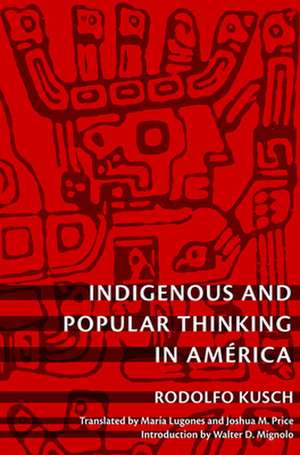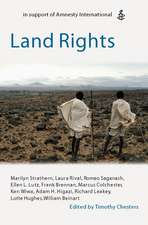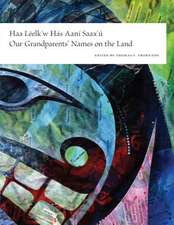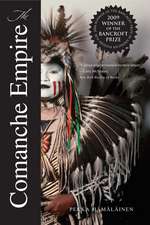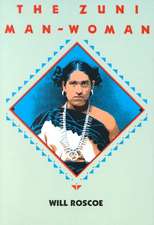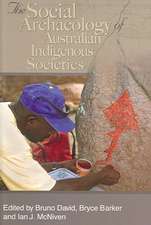Indigenous and Popular Thinking in América: Latin America Otherwise
Autor Rodolfo Kusch, Joshua M. Price, María Lugonesen Limba Engleză Paperback – 6 apr 2010
Din seria Latin America Otherwise
-
 Preț: 161.02 lei
Preț: 161.02 lei -
 Preț: 195.84 lei
Preț: 195.84 lei -
 Preț: 169.48 lei
Preț: 169.48 lei -
 Preț: 218.61 lei
Preț: 218.61 lei -
 Preț: 261.93 lei
Preț: 261.93 lei -
 Preț: 301.59 lei
Preț: 301.59 lei -
 Preț: 264.26 lei
Preț: 264.26 lei -
 Preț: 231.22 lei
Preț: 231.22 lei -
 Preț: 302.36 lei
Preț: 302.36 lei -
 Preț: 265.20 lei
Preț: 265.20 lei -
 Preț: 191.54 lei
Preț: 191.54 lei -
 Preț: 240.90 lei
Preț: 240.90 lei -
 Preț: 299.29 lei
Preț: 299.29 lei -
 Preț: 301.38 lei
Preț: 301.38 lei -
 Preț: 211.33 lei
Preț: 211.33 lei -
 Preț: 261.18 lei
Preț: 261.18 lei -
 Preț: 239.76 lei
Preț: 239.76 lei -
 Preț: 265.59 lei
Preț: 265.59 lei -
 Preț: 305.46 lei
Preț: 305.46 lei -
 Preț: 237.47 lei
Preț: 237.47 lei -
 Preț: 262.32 lei
Preț: 262.32 lei -
 Preț: 265.79 lei
Preț: 265.79 lei -
 Preț: 298.70 lei
Preț: 298.70 lei -
 Preț: 302.19 lei
Preț: 302.19 lei -
 Preț: 324.80 lei
Preț: 324.80 lei -
 Preț: 264.43 lei
Preț: 264.43 lei -
 Preț: 238.39 lei
Preț: 238.39 lei -
 Preț: 383.63 lei
Preț: 383.63 lei -
 Preț: 264.26 lei
Preț: 264.26 lei -
 Preț: 236.67 lei
Preț: 236.67 lei -
 Preț: 306.99 lei
Preț: 306.99 lei -
 Preț: 236.10 lei
Preț: 236.10 lei -
 Preț: 268.68 lei
Preț: 268.68 lei -
 Preț: 300.62 lei
Preț: 300.62 lei -
 Preț: 335.67 lei
Preț: 335.67 lei -
 Preț: 304.31 lei
Preț: 304.31 lei -
 Preț: 308.90 lei
Preț: 308.90 lei -
 Preț: 307.95 lei
Preț: 307.95 lei -
 Preț: 261.38 lei
Preț: 261.38 lei -
 Preț: 264.64 lei
Preț: 264.64 lei -
 Preț: 315.64 lei
Preț: 315.64 lei -
 Preț: 269.27 lei
Preț: 269.27 lei -
 Preț: 327.73 lei
Preț: 327.73 lei -
 Preț: 262.14 lei
Preț: 262.14 lei -
 Preț: 262.32 lei
Preț: 262.32 lei
Preț: 263.29 lei
Nou
Puncte Express: 395
Preț estimativ în valută:
50.38€ • 52.75$ • 41.79£
50.38€ • 52.75$ • 41.79£
Carte tipărită la comandă
Livrare economică 10-24 aprilie
Preluare comenzi: 021 569.72.76
Specificații
ISBN-13: 9780822346418
ISBN-10: 0822346419
Pagini: 296
Ilustrații: 20 illustrations
Dimensiuni: 168 x 234 x 18 mm
Greutate: 0.43 kg
Editura: MD – Duke University Press
Seria Latin America Otherwise
ISBN-10: 0822346419
Pagini: 296
Ilustrații: 20 illustrations
Dimensiuni: 168 x 234 x 18 mm
Greutate: 0.43 kg
Editura: MD – Duke University Press
Seria Latin America Otherwise
Recenzii
This translation of one of Roldolfo Kuschs most important works marks a significant step in the energetic conversation that has emerged over the last decade among postcolonial studies, indigenous studies, and Latin American studies. A translation of Kuschs work has been sorely needed, both to complement the writing of scholars including Walter D. Mignolo, who have drawn from and discussed Kusch, and to stand alongside translations of books by other Latin American and Caribbean intellectuals including Edouard Glissant, Fernando Ortiz, and Enrique Dussel.Michael Hames-García, author of Fugitive Thought: Prison Movements, Race, and the Meaning of Justice
Indigenous and Popular Thinking in América is a superior work by Rodolfo Kusch, and María Lugoness and Joshua M. Prices superb translation is a major contribution to English-language philosophy. Kuschs book operates on many levels, as a post-Heideggerian phenomenology of culture, an existential analysis, and a sustained reflection on Otherness.Mario Sáenz, author of The Identity of Liberation in Latin American Thought
Indigenous and Popular Thinking in América is a superior work by Rodolfo Kusch, and María Lugoness and Joshua M. Prices superb translation is a major contribution to English-language philosophy. Kuschs book operates on many levels, as a post-Heideggerian phenomenology of culture, an existential analysis, and a sustained reflection on Otherness.Mario Sáenz, author of The Identity of Liberation in Latin American Thought
Textul de pe ultima copertă
""Indigenous and Popular Thinking in America" is a superior work by Rodolfo Kusch, and Maria Lugones's and Joshua M. Price's superb translation is a major contribution to English-language philosophy. Kusch's book operates on many levels, as a post-Heideggerian phenomenology of culture, an existential analysis, and a sustained reflection on Otherness."--Mario Saenz, author of "The Identity of Liberation in Latin American Thought"
Descriere
A seminal philosophic work that endeavors to identify and recover indigenous styles of thinking--by an Argentine philosopher still almost unknown in the United States.
